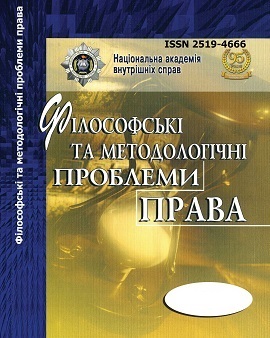Methodology of Research of Legal Institutions of Marriage and Family
Abstract
The article reveals the essence of the methodology of the study of the constitutional and legal regulation of marriage and the family, which consists of different levels of complexity of methods, which have: general scientific, general legal and special legal character.
Special legal methods allow to effectively investigate the specifics of the subject of research on one-level and two-level levels. The first level of special-legal methods (the lowest level)
is represented by one-level (theoretical and practical) and two-level (interrelated, or even) special-legal methods of analysis of constitutional and legal regulation of marriage and family.
The second level of special-legal research methods is presented by two-level (interdependent, or even) methods of analysis of constitutional and legal regulation of marriage and family, in particular such as: analysis and synthesis; induction and deduction.
The second level of methods include general legal methods of investigation (the method of legal modeling and analysis, hypothetical and historical and legal methods). These methods are the basis of the study of the constitutional and legal principles of marriage and family and reveal their heuristic and historical content.
And completes the structural methods of research, the universal scientific method of dialectical knowledge, which is based on three philosophical laws – the law of unity and the struggle of opposites, the law of the transfer of quantity in quality and the law of denial of objections, which appear in a dialectical way alone, in pairs, and all three at the same time. A characteristic feature of the dialectical method is that all statements and concepts are divided into two groups. The first group of the dialectical method is quantitatively small – it covers the set of initial concepts and assertions that underlie the theory of constitutional law and formulate the fundamental laws of the object. Such initial concepts and statements are called principles. The second group of the dialectical method is a set of derivative concepts and assertions of research, which follow from the original provisions. These include conclusions about the imperfect categorical component of the study; about the proper level of implementation of its constitutional norms; on the expediency of dialogical forms of establishing the interaction of the state with public organizations in the implementation of the constitutional and legal regulation of marriage and family.
All these research methods combine with each other. At the same time, special-legal methods of constitutional-legal regulation of marriage and family can not contradict general scientific and general law methods, because they are their kind.
Downloads
Abstract views: 186 PDF Downloads: 1370
Copyright (c) 2018 Philosophical and Methodological Problems of Law

This work is licensed under a Creative Commons Attribution-NonCommercial-NoDerivatives 4.0 International License.
- Authors reserve the right to authorship of their own work and transfer to the magazine the right of the first publication of this work under the terms of the Creative Commons Attribution License, which allows other persons to freely distribute published work with mandatory reference to authors of the original work and the first publication of an article in this magazine.
- Authors have the right to enter into separate additional agreements on non-exclusive dissemination of the work in the form in which it was published in the journal (for example, to post an article in the institution's repository or to publish as part of a monograph), provided that the link to the first publication of the work in this journal is maintained.
- The journal's policy allows and encourages the posting of articles by authors on the Internet (for example, in electronic storehouses of institutions or on personal websites), both before the submission of this manuscript to the editorial office and during its editorial processing, as this contributes to the creation of a productive scientific discussion and positively affects the efficiency and dynamics of citing the published work.




